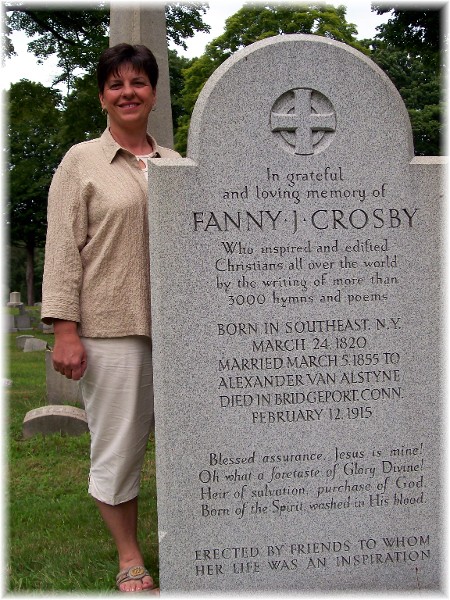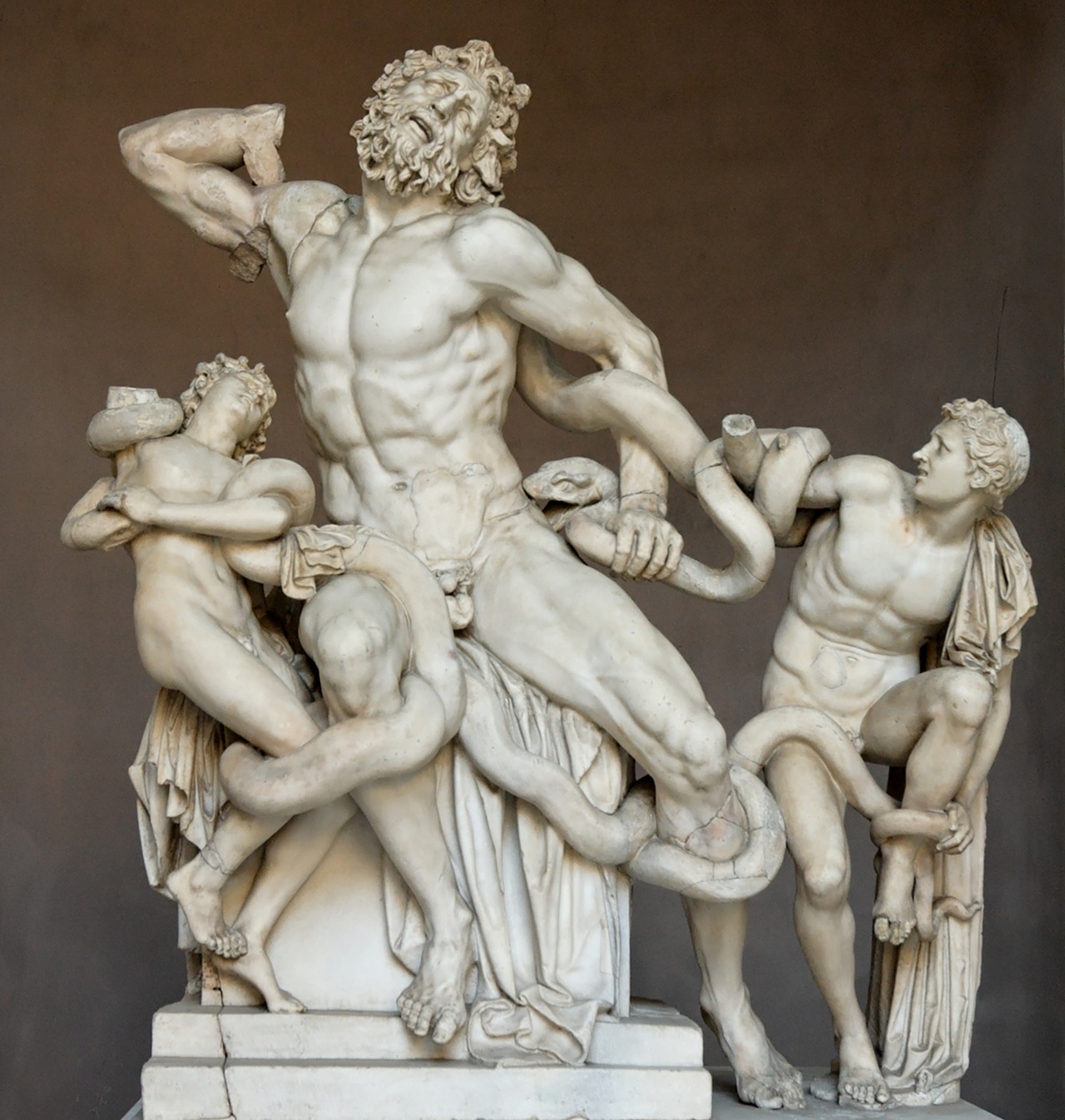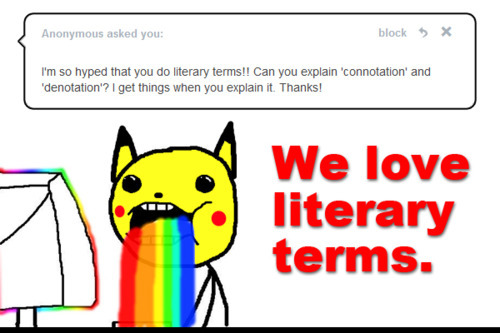I think he wrote the story the way he did (a bildungsroman about a poor boy with "Dickens-style" characters and themes) to portray how life was like in the time. He showed his opinions on social status by showing the wealthy as unhappy and the poor as satisfied, the women as tyrranical and the men as practical, and the analytical as successful. He indirectly characterized his characters through their actions and motives for their actions, for example Joe takes on Mrs Joe and Pip out of pity and love for the young woman and her infant brother, showing his compassion and good nature.
Tuesday, January 29, 2013
Tuesday, January 22, 2013
Lit Terms 6-30
Analogy: a comparison made between two things to show the similarities.
Analysis: a method in which a worker or idea is separated into its parts, and those parts are given rigorous and detailed scrutiny.
Anaphora: a device or repetition in which a word or words are repeated at the beginning of two or more lines, phrases, clauses, or sentences.
Anecdote: a short story used to illustrate a point.
Antagonist: a person or force opposing the protagonist in a drama or narrative.
Antithesis: a balancing of one term against another for emphasis or stylistic effectiveness.
Aphorism: a terse, pointed statement expressing some wise or clever observation about life.
Apologia: a defense or justification for some doctrine , piece of writing, or action; also apology.
Apostrophe: a figure of speech in which an absent or dead person, an abstract quality, or something inanimate or nonhuman is addressed directly.
Argument(ation): the process of convincing a reader by either the truth or falsity of an idea or proposition; also, the thesis or proposition itself.
Assumption: the act of supposing, or taking for granted a thing one does.
Audience: the intended listener or listeners.
Characterization: the means by which a writer reveals a character's personality.
Chiasmus: a reversal in the order of words so that the second half or the statement balances the first half in reverse order.
Circumlocution: a roundabout or evasive speech or writing, in which many words are used but a few would have sufficed.
Classicism: art, literature, and music reflecting the principles of ancient Greece and Rome; tradition, reason, clarity, order, and balance.
Cliche: a phrase or situation overused within society.
Climax: the decisive point in a narrative or drama; the point of greatest intensity or interest at which plot question is answered or resolved.
Colloquialism: folksy speech, slang words, or phrases usually used in informal conversation.
Comedy: originally a nondramatic literary piece of work that was marked by a happy ending now a term to describe a ludicrous, farcical, or amusing event designed to provide enjoyment or produce smiles and laughter.
Conflict: struggle or problem in a story causing tension.
Connotation: implicit meaning, going beyond dictionary definition.
Contrast: a rhetorical device by which one element (idea or object) is thrown into opposition to another for the sake of emphasis or clarity.
Denotation: plain dictionary definition.
Denouement (day-new-mahn): loose ends tied up in the story after the climax, closure, conclusion.
Analysis: a method in which a worker or idea is separated into its parts, and those parts are given rigorous and detailed scrutiny.
Anaphora: a device or repetition in which a word or words are repeated at the beginning of two or more lines, phrases, clauses, or sentences.
Anecdote: a short story used to illustrate a point.
Antagonist: a person or force opposing the protagonist in a drama or narrative.
Aphorism: a terse, pointed statement expressing some wise or clever observation about life.
Apologia: a defense or justification for some doctrine , piece of writing, or action; also apology.
Apostrophe: a figure of speech in which an absent or dead person, an abstract quality, or something inanimate or nonhuman is addressed directly.
Argument(ation): the process of convincing a reader by either the truth or falsity of an idea or proposition; also, the thesis or proposition itself.
Assumption: the act of supposing, or taking for granted a thing one does.
Audience: the intended listener or listeners.
Characterization: the means by which a writer reveals a character's personality.
Chiasmus: a reversal in the order of words so that the second half or the statement balances the first half in reverse order.
Circumlocution: a roundabout or evasive speech or writing, in which many words are used but a few would have sufficed.
Classicism: art, literature, and music reflecting the principles of ancient Greece and Rome; tradition, reason, clarity, order, and balance.
Cliche: a phrase or situation overused within society.
Climax: the decisive point in a narrative or drama; the point of greatest intensity or interest at which plot question is answered or resolved.
Colloquialism: folksy speech, slang words, or phrases usually used in informal conversation.
Comedy: originally a nondramatic literary piece of work that was marked by a happy ending now a term to describe a ludicrous, farcical, or amusing event designed to provide enjoyment or produce smiles and laughter.
Conflict: struggle or problem in a story causing tension.
Connotation: implicit meaning, going beyond dictionary definition.
Contrast: a rhetorical device by which one element (idea or object) is thrown into opposition to another for the sake of emphasis or clarity.
Denotation: plain dictionary definition.
Thursday, January 17, 2013
Poetry Analysis
Poetry Analysis
1. The Love Song of J. Alfred Prufrock
Paraphrase: This long poem seems to be someone talking of approaching a lover, like a man wanting to approach a woman. Yet this man can't seem to be able to do it. He talks of life, and talks of how others are talking of "Michelangelo." This man seems to think that he is inadequate and not on the level of the woman he loves.
Purpose: I believe the purpose is the man trying to air out his thoughts about whether he should approach his love or not.
Structure: This poem actually seems more like a monologue, with rhyming here and there. I think that type of poetry is called free verse.
Shift: The man seems to start off more hopeful sounding, but towards the end it seems like he has kind of given up. Like he realized that maybe there isn't a point in what he is saying.
Speaker: Prufrock is the speaker!
Spelling/Grammar/Diction: The style of writing seems to be quite modern. There are a lot of hyphenated words such as "one-night", "window-panes" and "shirt-sleeves" that you don't see used very often nowadays.
Tone: Prufrock's tone is very solemn. I picture him standing there, speaking quietly to himself with a look of deep thought on his face.
2. Mending Wall by Robert Frost
Paraphrase: The narrator and his neighbor spend some time mending the wall that separates their properties. The narrator questions why there is a wall there at all, while the neighbor just says that "Good fences make good neighbors." Even though the narrator doesn't seem to totally agree with it, the neighbor repeats it once again.
Purpose: This seems like the kind of poem that could be interpreted in many different ways and on many different levels. Maybe Frost is using the narrator as his window to his own question of the purpose of building and mending walls between us. I can only hope to touch the surface of the purpose.
Structure: A quick search seems to show that this is blank verse.
Shift: Towards the beginning, the narrator talks of the process of going with his neighbor to fix the wall. It seems to be a routine thing for them. Then he goes on to talk of their conversation of the significance of the wall. He questions it's presence, while his neighbor just accepts it.
Speaker: The speaker is anonymous to the audience.
Spelling/Grammar/Diction: There is nothing special or out of the ordinary in the spelling or grammar, except for the strange hyphenated word "frozen-ground-swell."
Tone: Frost has a very light, conversational tone. It sounds a little thoughtful, but not in a super serious way.
3. Let America Be America Again by Langston Hughes
Paraphrase: The speaker seems to yearn for his old America, land of equality, liberty, and dreams. When asked who is speaking, he describes himself as every kind of American that had been wronged, and begs for America to be America again.
Purpose: This poem seems to be rallying for America to change, to be the America that every purpose dreams it to be.
Structure: The poem has no particular structure with a few rhyming parts here and there, so I would categorize it as free verse.
Shift: The speaker starts the poem by saying how America isn't what it's supposed to be. He then goes on to describe himself as the wronged Americans, then back to begging for America to change.
Speaker: I would say Hughes is the speaker in this poem.
Spelling/Grammar/Diction: The spelling and grammar are simple and modern.
Tone: Hughes' tone is motivational, and powerful. He sounds as if he was speaking to a crowd of people who are upset with the way America has treated them.
4. The Second Coming by William Butler Yeats
Paraphrase: The narrator describes a terrible scene, where anarchy is set loose and innocence is lost. It seems as if the Second Coming has arrived, and there is a terrible beast coming towards Bethlehem with a lion body and a head of a man. Sounds nightmarish.
Purpose: This seems to be the painting of what Yeats might imagine the second coming of Christ is to be like.
Structure: There seems to be no rhyming or structure, so it is probably free verse. Although, after a quick search, it might be very loosely considered iambic pentameter. But only barely.
Shift: In the beginning, the narrator seems to be afraid of the monstrosities happening. But when he realizes that this is the second coming, he seems to be accepting of the new age that is coming, no matter how terrifying.
Speaker: Anonymous.
Spelling/Grammar/Diction: Modern style of writing.
Tone: The tone seems to be quite calm for such a horrible description. It's as if a preacher is talking of the coming of the end of the world, passionate yet not panicky.
5. Dover Beach by Matthew Arnold
Paraphrase: Arnold describes the sea, and the many things you hear and see when near it. He talks of a philosopher playwright who compared the tide's ebb and flow to human misery. He than calls for love instead of the war that goes on in the world.
Purpose: I'm unclear as to what this poem's purpose truly is. After a quick search it is shown to be a poem that he wrote for his wife after they visited Dover.
Structure: Free verse! :) I'm gettin' good at this.
Shift: The poem starts with a simple yet beautiful description of the sea itself. Then it changes to how it's related to humans and the world itself.
Speaker: Matthew Arnold himself.
Spelling/Grammar/Diction: Not too difficult, modern style of writing and speech.
Tone: The tone seems to be very dramatic, like a story teller spinning and weaving a tale of the ocean. The poem itself is very pretty sounding. A perfect thing to write for your significant other.
Paraphrase: This long poem seems to be someone talking of approaching a lover, like a man wanting to approach a woman. Yet this man can't seem to be able to do it. He talks of life, and talks of how others are talking of "Michelangelo." This man seems to think that he is inadequate and not on the level of the woman he loves.
Purpose: I believe the purpose is the man trying to air out his thoughts about whether he should approach his love or not.
Structure: This poem actually seems more like a monologue, with rhyming here and there. I think that type of poetry is called free verse.
Shift: The man seems to start off more hopeful sounding, but towards the end it seems like he has kind of given up. Like he realized that maybe there isn't a point in what he is saying.
Speaker: Prufrock is the speaker!
Spelling/Grammar/Diction: The style of writing seems to be quite modern. There are a lot of hyphenated words such as "one-night", "window-panes" and "shirt-sleeves" that you don't see used very often nowadays.
Tone: Prufrock's tone is very solemn. I picture him standing there, speaking quietly to himself with a look of deep thought on his face.
2. Mending Wall by Robert Frost
Paraphrase: The narrator and his neighbor spend some time mending the wall that separates their properties. The narrator questions why there is a wall there at all, while the neighbor just says that "Good fences make good neighbors." Even though the narrator doesn't seem to totally agree with it, the neighbor repeats it once again.
Purpose: This seems like the kind of poem that could be interpreted in many different ways and on many different levels. Maybe Frost is using the narrator as his window to his own question of the purpose of building and mending walls between us. I can only hope to touch the surface of the purpose.
Structure: A quick search seems to show that this is blank verse.
Shift: Towards the beginning, the narrator talks of the process of going with his neighbor to fix the wall. It seems to be a routine thing for them. Then he goes on to talk of their conversation of the significance of the wall. He questions it's presence, while his neighbor just accepts it.
Speaker: The speaker is anonymous to the audience.
Spelling/Grammar/Diction: There is nothing special or out of the ordinary in the spelling or grammar, except for the strange hyphenated word "frozen-ground-swell."
Tone: Frost has a very light, conversational tone. It sounds a little thoughtful, but not in a super serious way.
3. Let America Be America Again by Langston Hughes
Paraphrase: The speaker seems to yearn for his old America, land of equality, liberty, and dreams. When asked who is speaking, he describes himself as every kind of American that had been wronged, and begs for America to be America again.
Purpose: This poem seems to be rallying for America to change, to be the America that every purpose dreams it to be.
Structure: The poem has no particular structure with a few rhyming parts here and there, so I would categorize it as free verse.
Shift: The speaker starts the poem by saying how America isn't what it's supposed to be. He then goes on to describe himself as the wronged Americans, then back to begging for America to change.
Speaker: I would say Hughes is the speaker in this poem.
Spelling/Grammar/Diction: The spelling and grammar are simple and modern.
Tone: Hughes' tone is motivational, and powerful. He sounds as if he was speaking to a crowd of people who are upset with the way America has treated them.
4. The Second Coming by William Butler Yeats
Paraphrase: The narrator describes a terrible scene, where anarchy is set loose and innocence is lost. It seems as if the Second Coming has arrived, and there is a terrible beast coming towards Bethlehem with a lion body and a head of a man. Sounds nightmarish.
Purpose: This seems to be the painting of what Yeats might imagine the second coming of Christ is to be like.
Structure: There seems to be no rhyming or structure, so it is probably free verse. Although, after a quick search, it might be very loosely considered iambic pentameter. But only barely.
Shift: In the beginning, the narrator seems to be afraid of the monstrosities happening. But when he realizes that this is the second coming, he seems to be accepting of the new age that is coming, no matter how terrifying.
Speaker: Anonymous.
Spelling/Grammar/Diction: Modern style of writing.
Tone: The tone seems to be quite calm for such a horrible description. It's as if a preacher is talking of the coming of the end of the world, passionate yet not panicky.
5. Dover Beach by Matthew Arnold
Paraphrase: Arnold describes the sea, and the many things you hear and see when near it. He talks of a philosopher playwright who compared the tide's ebb and flow to human misery. He than calls for love instead of the war that goes on in the world.
Purpose: I'm unclear as to what this poem's purpose truly is. After a quick search it is shown to be a poem that he wrote for his wife after they visited Dover.
Structure: Free verse! :) I'm gettin' good at this.
Shift: The poem starts with a simple yet beautiful description of the sea itself. Then it changes to how it's related to humans and the world itself.
Speaker: Matthew Arnold himself.
Spelling/Grammar/Diction: Not too difficult, modern style of writing and speech.
Tone: The tone seems to be very dramatic, like a story teller spinning and weaving a tale of the ocean. The poem itself is very pretty sounding. A perfect thing to write for your significant other.
Purpose: I'm unclear as to what this poem's purpose truly is. After a quick search it is shown to be a poem that he wrote for his wife after they visited Dover.
Structure: Free verse! :) I'm gettin' good at this.
Shift: The poem starts with a simple yet beautiful description of the sea itself. Then it changes to how it's related to humans and the world itself.
Speaker: Matthew Arnold himself.
Spelling/Grammar/Diction: Not too difficult, modern style of writing and speech.
Tone: The tone seems to be very dramatic, like a story teller spinning and weaving a tale of the ocean. The poem itself is very pretty sounding. A perfect thing to write for your significant other.
Structure: Free verse! :) I'm gettin' good at this.
Shift: The poem starts with a simple yet beautiful description of the sea itself. Then it changes to how it's related to humans and the world itself.
Speaker: Matthew Arnold himself.
Spelling/Grammar/Diction: Not too difficult, modern style of writing and speech.
Tone: The tone seems to be very dramatic, like a story teller spinning and weaving a tale of the ocean. The poem itself is very pretty sounding. A perfect thing to write for your significant other.
Wednesday, January 16, 2013
St. Crispin's Day Speech
Tuesday, January 15, 2013
AP Lit Terms 1
Allegory: A tale in prose or verse in which characters, actions, or settings represent abstract ideas or moral qualities; a story that uses symbols to make a point.

Allusion: A reference to a person, a place, an event, or a literary work that a writer expects a reader to recognize.

Alliteration: A repetition of similar initial sounds, usually consonants, in a group of words.

Ambiguity: Something uncertain as to interpretation.

Anachronism: Something that shows up in the wrong place or wrong time.


Allusion: A reference to a person, a place, an event, or a literary work that a writer expects a reader to recognize.

Alliteration: A repetition of similar initial sounds, usually consonants, in a group of words.

Ambiguity: Something uncertain as to interpretation.

Anachronism: Something that shows up in the wrong place or wrong time.

Sunday, January 13, 2013
SPRING SEMESTER PLAN 1
SMART GOAL
Specific
Measurable
Attainable
Reinforceable
Timely
My goal over the next few months is to utilize this class to further prepare myself for becoming an "Imagineer". I plan to major in Mechanical Engineering in college, and I am excited to see how Dr. Preston will stretch the process of preparing for the AP exam in May, to priming us for our ultimate goal.
Specific
Measurable
Attainable
Reinforceable
Timely
My goal over the next few months is to utilize this class to further prepare myself for becoming an "Imagineer". I plan to major in Mechanical Engineering in college, and I am excited to see how Dr. Preston will stretch the process of preparing for the AP exam in May, to priming us for our ultimate goal.
Thursday, January 10, 2013
AP PREP POST 1: SIDDHARTHA
Siddhartha Study Questions:
1. How can we know who is the right teacher for us?
2. Can wisdom be taught?
3. What is the relation of words to wisdom? Do words tend to enhance or limit wisdom?
4. In Chapter 8, Siddhartha thinks of his former life as “that soft, well-upholstered hell.” What does this description reveal about the nature of “hell” for someone seeking spiritual salvation or enlightenment?
5. Why is Siddhartha’s long journey necessary before he can achieve enlightenment, and what things does this suggest about the nature of enlightenment?
6. Describe the ancient Indian society in which Siddhartha lives as it is portrayed in the book. In what ways is it different from modern American society, and in what ways is it similar?
7. One of the most distinctive characteristics of the novel’s plot is its use of coincidence. Why do you think Hesse chose to structure the story in this way, and what theme(s) does it suggest?
Subscribe to:
Posts (Atom)




















